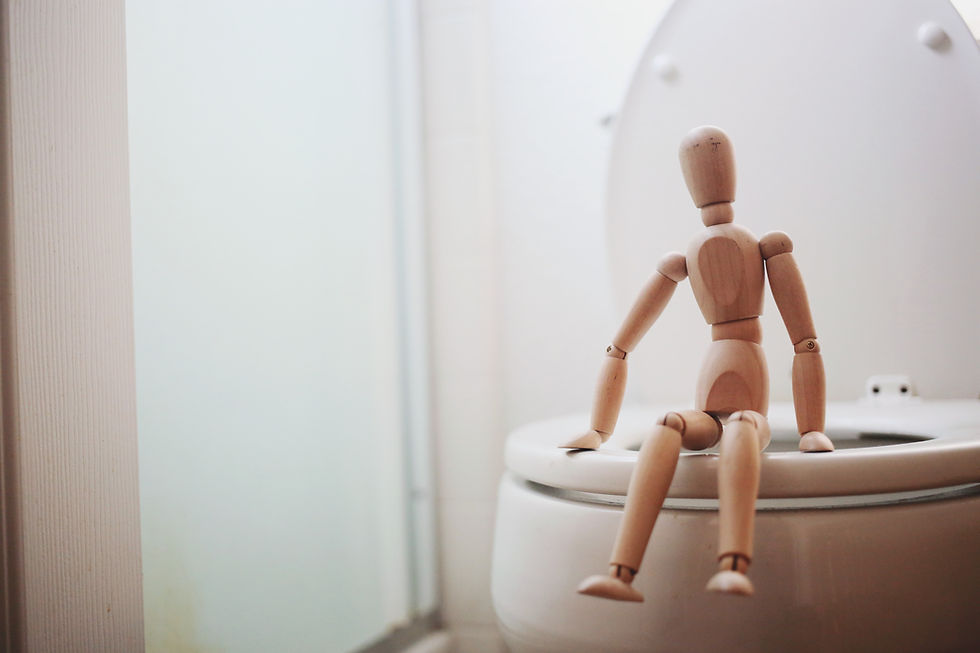Constipation 101
- Zahra Tromsness, MHSc, RD

- Aug 11, 2020
- 3 min read
Updated: Sep 1, 2020
Having a bowel movement three times a week up to three times a day is within the range of normal stool elimination.

Constipation
Constipation is a large and compact clinical issue which impacts approximately 1/5 of the global population and is the most common digestive complaint responsible for about 2.5 million visits to the doctor annually.
While constipation is present among all groups, older adults, women, and non-Caucasians are predominantly at risk.
If you live with IBS and experience constipation, you’re not alone. Over 50% of those suffering from IBS share this complaint. Constipation can have a profound impact on your well-being and ability to function and may aggravate other IBS symptoms, such as excessive gas, bloating and abdominal pain.
What is constipation?
Having a bowel movement three times a week up to three times a day is within the range of normal stool elimination. Generally, constipation is diagnosed when you have to pass small amounts of stool that are dry and hard, difficult and/or painful to pass and occur fewer than three times a week.
Constipation can be a chronic issue or happen occasionally. Chronic idiopathic constipation (CIC) and the IBS subtype constipation (IBS-C) are the two main types of chronic constipation. IBS-C accounts for about 5% of those who suffer with IBS.
Symptoms
While each individual’s experience of constipation varies, the followings are the most common symptoms:
Bowel movements fewer than three times a week
Lumpy or hard stools
Feeling of incomplete evacuation
Feeling bloated or uncomfortable
Straining or difficulty passing a bowel motion
Abdominal pain
Sensation of obstruction in the anus and/or rectum
Using fingers to remove stool (digital evacuation)

Causes
As food moves through the bowels, the colon absorbs water while forming stool. Muscle contractions then guide the stool toward the rectum, absorbing water along the way, which makes the stool solid. When the colon's muscle contractions are slow or lethargic (for various reasons), stool passes through the colon too slowly resulting in too much water being absorbed, leading to hard and dry stool.
Contributors to constipation can include:
Slow or delayed movement of food through the bowel
Defecation disorders such as dyssynergic defecation (contraction instead of relaxation of muscles of the rectum during a bowel movement)
Issues with intestinal secretion
Bowel motility disruptions (common with diabetes and hypothyroidism)
Neurologic effects of stroke, spinal cord disorders, and Parkinson's disease
Inadequate rectal propulsion
Changes in the gut microbiota and increase in methane gas resulting in slow intestinal transit
Medications (e.g. some pain killers, some antidepressants)
Certain supplements such as iron
Dietary factors such as inadequate fibre intake, diet high in protein and dairy
Dehydration
Lack of physical activity
Abuse or misuse of laxatives
Ignoring or delaying the urge to open your bowels
Changes in lifestyle or habits (travel, pregnancy)
Stress, anxiety or depression
Functional Bowel
Disorders (FBD) such as IBS

Treatment
A range of strategies such as increasing dietary fibre and fluid, being more active, learning toileting techniques and correcting bowel habits can all be helpful first-line therapies. However, patients with more severe constipation will often require a more integrative approach that includes dietary and lifestyle measures, over-the-counter and/or prescription medications, behavioural therapies (e,g biofeedback) and/or neuromodulation.
In the next blog post we will review various dietary and lifestyle modification that can help to reduce constipation.
Low FODMAP Diet and constipation
Does following a Low FODMAP Diet cause constipation?
Those following a low FODMAP diet may experience constipation. The reasons can include:
A) Low FODMAP diet restricts intake of osmotically active carbohydrates (e.g. fructose and sugar polyols) that draw water into the small intestine and help form and move healthy stools.
B) Low FODMAP diet limits high fibre foods, such as cereals, grains, veggies and fruit, legumes and nuts that promote bowel motility.
However, not all evidence supports this view. For example, some studies show that a low FODMAP diet causes constipation, while others show that the diet helps to relieve constipation. The low FODMAP diet has been shown to be effective in IBS-C when a fibre supplement is taken to ensure a sufficient fibre intake (25-30g/day).
It is highly recommended to consult a dietitian that specializes in the low FODMAP diet. They can help you to carefully replace high FODMAP, high fibre foods with nutritionally equivalent, low FODMAP, high fibre substitutes and ensure you are still getting a healthy dose of prebiotics, and probiotics. This can be achieved through a whole food diet and supplements when necessary.

Work with a Specialist Dietitian
If you have IBS and suffer from constipation, Gut-Loving Dietitian can help! Remember that the low FODMAP diet is strictly for short term use. Furthermore, it's vital to ensure you're getting adequate nutrients since you'll be avoiding or reducing important food groups. So instead of stressing over what to eat and wondering when your symptoms will flare up next, talk to a specialist dietitian, trained in IBS management.








Comments